18-year-old Zala from the Afghanistan Newsroom profiles two Afghan women in Germany and their ground-breaking art
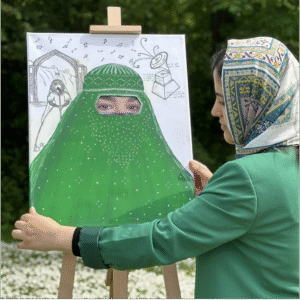
‘Through our art, we uncover hidden stories and give voice to the silenced.’
Picture courtesy of: Zahra Abbasi Manizha Abbasi
Article link copied.
July 24, 2025
Two sisters using art to reveal the lives of Afghan women
In a private studio in Mannheim, Germany, two Afghan sisters channel their trauma and resilience into art that defies oppression and reclaims joy. Manizha and Zahra Abbasi, both in their twenties, fled Afghanistan after the Taliban’s return in 2021. They arrived in Germany as refugees, but their journey was not just one of displacement – it was a transformation into artists and activists.
Zahra’s path to art was shaped by both passion and circumstance. A former national-level cyclist, she was just a week away from receiving her ID card to officially join Afghanistan’s under-18 cycling team when the Taliban seized power.
Harbingers’ Weekly Brief
“Cycling was my dream,” she recalls. “But the Taliban banned it. I had to leave everything behind.” Alongside her athletic pursuits, Zahra had always been drawn to painting. In exile, she turned to her art to process her grief and to speak out.
Manizha, a former journalist and film student, faced similar erasure. “My work and education became direct threats to my life,” she says. “Germany was the only country that accepted my whole family, so we came here for safety.”
In the safety of exile, the sisters found a new purpose: to make visible the lives of Afghan women silenced under Taliban rule.
The sisters’ art is both intimate and political.
Zahra explains: “We want people to see the real stories of Afghan women – their strength, beauty, and dreams. But also, the darkness they face under the Taliban.”
Zahra’s photography captures Afghan women in traditional dresses and burkas, juxtaposing them with images of foreign women on a ballet course. The contrast is stark, yet the connection is clear.
Manizha’s paintings depict women in burkas, their faces obscured, yet their presence undeniable. “Our paintings represent all the talented Afghan women whose dreams were erased,” she says. “Millions of ‘Emma Watsons’ disappear silently every day.”
The sisters also perform dance as resistance. Wearing handmade Afghan dresses, they perform traditional movements – even belly dancing – in public spaces. “There are no ballet dancers from Afghanistan,” Zahra says. “It’s completely banned. I wanted to perform what was never allowed, to show joy, beauty and the creativity in Afghan women’s hands to the world.”

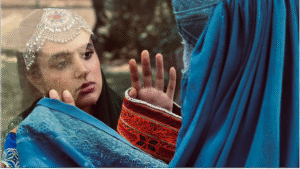
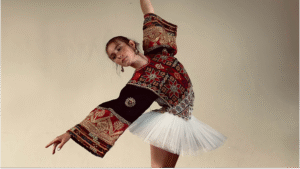
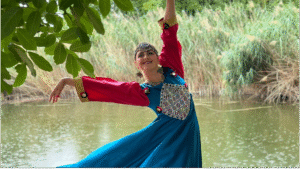
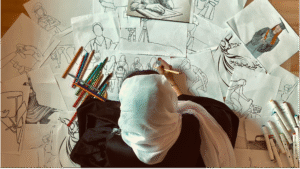
Zahra (left) and Manizha. Click on the right to see a selection of the sisters' work.
Picture courtesy of: Zahra Abbasi Manizha Abbasi
Picture courtesy of: Zahra Abbasi Manizha Abbasi
Picture courtesy of: Zahra Abbasi Manizha Abbasi
Picture courtesy of: Zahra Abbasi Manizha Abbasi
Picture courtesy of: Zahra Abbasi Manizha Abbasi
Art as resistance
Through their art, the sisters aim to reclaim what was stolen from Afghan women – their right to be themselves, to choose, to feel, to speak. “The basic right to live fully as human beings has been taken from Afghan women,” Zahra says. “Through our art, we uncover hidden stories and give voice to the silenced.”
Their work is not just for themselves; it is for Afghans back home and for the world. “We want the younger generation to understand what’s happening to them,” Manizha says. “And for Western audiences, we want them to see us as more than victims. We are artists, thinkers, and survivors.”
Despite the risks – harassment, threats and accusations of exaggerating their reality – the sisters continue to create. “Speaking out may be risky,” Zahra says, “but staying silent is even more dangerous.”
Their message is clear: Afghan women are not passive. They are creative, resilient and fighting for their right to exist – fully, visibly, and loudly. “Art is part of our lives now,” Manizha says. “It’s how we reclaim who we are.”
Through their platform, Afghan Unseen, the sisters offer their art to the world, inviting others to witness and support their vision. Their work is a testament to the power of art as resistance and the unbreakable spirit of Afghan women.
Written by:
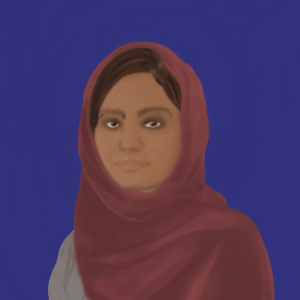
Afghanistan
Contributor
LEARN Journalism Club
Illustration by Yuliia Muliar
Born in 2007, Zala is currently studying journalism through the joint project between Harbingers’ Magazine and LEARN Afghan.
She is passionate about journalism and storytelling, and has contributed to school magazines. In her free time, Zala enjoys exploring creative writing and researching news trends. She aspires to become a doctor, because she wants to make a real difference in people’s lives.
Zala speaks Pashto, Dari, Urdu and English.
Due to security concerns the author’s image and surname have been omitted
Edited by:

🌍 Join the World's Youngest Newsroom—Create a Free Account
Sign up to save your favourite articles, get personalised recommendations, and stay informed about stories that Gen Z worldwide actually care about. Plus, subscribe to our newsletter for the latest stories delivered straight to your inbox. 📲
© 2025 The Oxford School for the Future of Journalism


